Accidents and injuries can happen at any job, whether you work on a construction site, in an office, or at a restaurant. When you get hurt or sick because of your job, there’s something called workers’ compensation insurance that helps out. It’s a safety net for both you and your boss. But how does it work? Let’s break it down and see how it all fits together.
Understanding Workers’ Compensation
Workers’ compensation, also known as workers’ comp, is like a helping hand for workers who get hurt or sick because of their jobs. It’s a rule in most states, and it’s there to ensure workers and bosses have a backup plan when things go wrong. If you get hurt or sick because of your job, there’s a system to give you money and medical help.
Coverage and Benefits
Workers’ compensation helps out with different kinds of job related problems, like:
- Accidents: When something unexpected happens at work and you get hurt.
- Repetitive stress injuries: Doing the same movements repeatedly makes you hurt.
- Occupational diseases: If you get sick because of something at work.
So, if any of these things happen to you, here’s what workers’ comp can do:
- Medical expenses: It pays for your doctor visits, time in the hospital, surgeries, and the medicine you need to get better.
- Wage replacement: If you can’t work while you’re getting better, workers’ comp can give you some money to compensate for the missing wages.
- Rehabilitation: Sometimes, you might need help learning how to work again after being hurt. Workers’ comp can pay for physical therapy or teach you new job skills.
- Death benefits: This is sad, but if someone dies because of their job, workers’ comp can give money to their family to help them out.
Determining Cost
So, how much you have to pay for workers’ comp depends on a few things:
- What kind of business do you run: Some jobs are more risky than others. If your business is in a risky industry, you might have to pay more for insurance.
- Where you’re located: The laws and money stuff in your state can change how much insurance costs. So, it’s different depending on where you are.
- How many people work for you: The insurance bill increases if you have many employees.
- Your past accidents: If you’ve had many accidents at work before, the insurance can cost more. It’s kind of like car insurance – if you’ve had many accidents, your car insurance goes up.
All these things tell you how much you’ve got to pay for workers’ comp.
Experience Rating
Experience rating helps businesses to decide how much they pay for insurance by examining their accident history. So, if your workplace is super safe and has fewer accidents, you get lower insurance bills! It’s a discount because you’re doing a good job of keeping everyone safe.
But the insurance can cost more if your workplace is a bit riskier and has more accidents. It’s a reminder that you need to be extra careful because accidents can increase insurance bills.
Legal Requirements
In most states, if you run a business and have employees (there are a few exceptions, but only a few), the law says you must get workers’ comp insurance. It’s not optional; it’s a must do.
If you ignore this law and don’t get the insurance, you’re in for some big trouble. We’re talking serious stuff like:
- Fines: You’ll have to pay a bunch of money as a penalty.
- Imprisonment: In some cases, you could even end up in jail. Yep, it’s that serious.
- Business Problems: They might shut your business down because you need to follow the rules.
Filing a Claim
Okay, so if you get hurt or sick because of your job, here’s what you should do:
- Get Medical Help: First, see a doctor if you’re hurt or feeling unwell because of work. Your health is super important!
- Tell Your Boss: You must inform your boss about the injury or sickness. They’ll help you with the next steps.
- Fill Out Some Forms: There’s some paperwork to do. Your boss will give you the right forms to fill out. It’s stuff that the state says you have to do.
- Wait for Approval: After you send in your forms, the insurance company will review them and decide if you can get workers’ comp. If they say yes, you’re good to go!
- Get Paid: If approved, you’ll start getting money to help cover your expenses while you get better.
- Go Back to Work: When the doctor says you’re ready, you can go back to your job.
So, if something happens at work, take care of yourself, let your boss know, and follow the steps. Workers’ comp is there to help you through tough times.
Protection for Employers
Workers’ compensation insurance is a crucial safety for employees and employers in the United States. It ensures that employees who get hurt or sick due to work related activities receive the necessary medical care and financial support, helping them get back on their feet. However, it’s not just employees who benefit, employers are shielded from potential legal actions by injured workers. This arrangement forms a social contract, fostering a sense of security for both sides, promoting workplace safety, and avoiding drawn out legal battles. It’s important to note that workers’ compensation laws can vary from state to state, so both employees and employers should familiarize themselves with their specific state regulations to ensure compliance and protection.












